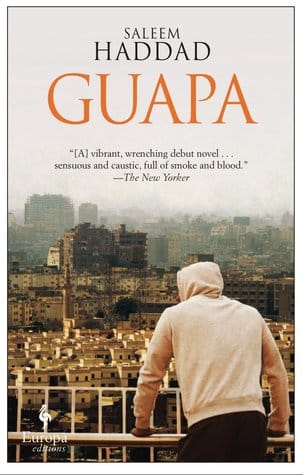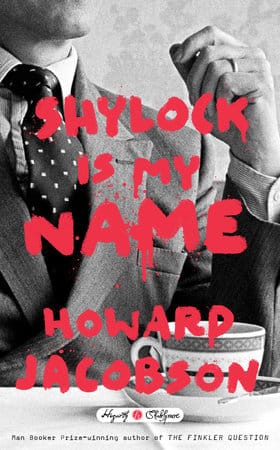Guapa is a highly contemporary political novel about idealism and disillusionment, about the pressures and contradictions of both Arab and American society, and about the struggle for self-definition within a marginalised sexual identity. The author’s reflections on his debut novel, and the “shelving” of LGBT fiction, make interesting reading on Isabel Costello’s Literary Sofa. Although I had some reservations about the voice, I commend Saleem Haddad for his thorough exploration of a complex world, and thank Europa editions for my review copy (my first from this publisher).
###############################################
Art collector and philanthropist, Simon Strulovitch meets Shylock in a cemetery in Cheshire (one of the wealthiest parts of Britain) and invites him back to his house. With an absent wife and an uncontrollable sixteen-year-old daughter, Beatrice, Simon feels an affinity for Shakespeare’s Jew. Although secular in belief and practice, he’s determined Beatrice won’t marry out. After several pages of debate on the nature of Jewishness, the novel proceeds to an amusing finale in which a young man’s foreskin takes the role of Shylock’s pound of flesh.
Although I enjoyed this novel overall, and found it challenging in both style and content. The discussion between the two possessive fathers, Strulovitch and Shylock, failed to engage me: an awful lot of scene setting while waiting for the story to start. (I vaguely recall something similar in the author’s Man Booker Prize winning The Finkler Question, which I gave up on, but, having enjoyed Zoo Time, the novel that followed, I thought I’d give this a try.) My second source of discomfort was that, as in a novel I read recently about Chinese American identity, the nature of minority identity is bound up with racism which, within this novel, was located primarily in the Gentile suspiciousness of the ritual circumcision of baby boys. Sadly, the novel didn’t enable me to resolve my own conflict between embracing diversity and vetoing unnecessary injury to those who can’t consent. (I’m equally uncomfortable with girl babies and toddlers having their ears pierced.)
In retrospect, I decided this was the author’s intention and concede it’s clever to write about racism in a way that challenges the reader in a parallel process. He also does this by making all his characters unlikeable (although not all are Jews), but it’s hard to enjoy unlikeable characters when the question’s been raised that this might be racist. However, I imagine that many readers, like me, would have little difficulty in disliking the fathers who perceive their daughters as their possessions.
This is the fourth novel I’ve read in the Hogarth Shakespeare series. Thanks to Vintage books for my review copy.
On the subject of foreskins, see my short story in Alliterati magazine. My fictional fathers have a tendency to be absent rather than controlling (although it’s possible to read Strulovitch as both, making a particularly toxic combination) as in my short stories Getting to grips with Liathach, My Father's Love, and Peace-and-Quiet Pancake. As for the unfortunate narrator of my forthcoming novel, Underneath, his father died before he was even born but still wields an influence in his mind.























 RSS Feed
RSS Feed





















